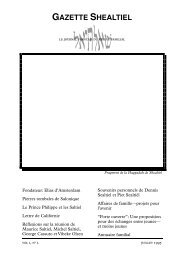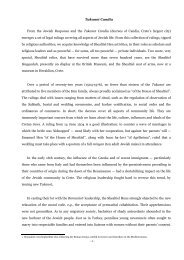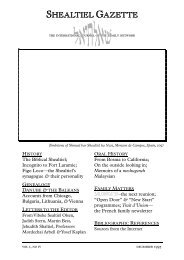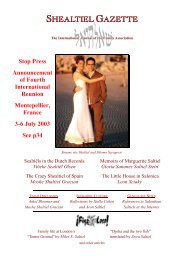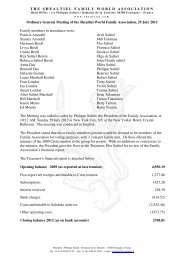The Cotopaxi ColonyMore to the point, the content of the Winnipeg lamentation precisely foreshadows the protests of deceit and economicexploitation, which come down to us from Cotopaxi. The striking similarity of the two instances of complaint suggests acommon source. They tell us that Jewish refugees all over North America at this time were given to view whatever misadventuresinitially came their way through lenses distorted <strong>by</strong> rumours picked up on the Atlantic crossing or at CastleGarden, the port of entry in New York—what we would now call urban myths.The winter of 1882-83Extravagance of expression is to the fore when we examine the conditions reported for the first winter. At first sight thestory is of unremitting hardship. The pioneers lost their crops to frost and the menaces of cattle, bears and beggingtribesmen (Schwarz, p11; Roberts, p127; <strong>Satt</strong>, pp20, 24, 25). Their cabins were meagre and lacked windows, doors andchimneys (<strong>Satt</strong>, pp19, 24, 25). Some settlers resorted to cut-sod huts and an abandoned cave for shelter (<strong>Satt</strong> p22). Onesettler swam a river in spate to obtain food for his starving family (RMHJN p2). In sum, the story presented is of isolatedand destitute pioneers. The setters were obliged to scavenge for coal and wood and benefited from charitable shipmentsfrom Denver of “clothing, food, medicine and other necessities” <strong>Satt</strong>, p26), as well as $500 in cash (Roberts,p129).Much of this turns out to be exaggerated. First the underlying conditions: the Colorado winter would have been no noveltyfor pioneers who came from what is now the Ukraine. If we compare the best data available for mid-winter fromthe original region of the pioneers, Lviv, with that of the weather station closest to the colonists’ new home, MonarchPass, we see an mean February average of 25°F and a mean minimum of 8°F in the old country compared to 15°F and12°F in the pass above the colonists’ new home. The high plateaus might have been more exposed than Monarch Pass,but we know that many of the settlers planned to stay in the more sheltered elevations of Cotopaxi itself (Schwarz p12).They evidently had no difficulty withstanding the climate in that all survived the first winter and several families electedto stay for a second (<strong>Satt</strong>, p29).The failed harvests were an undoubted disaster, but the pioneers’ clumsiness with the local fauna did them no favours,whether stock—the ox-team lost on arrival (Gulliford para 5); the roaming cattle of the Wet Mountain valley (Schwarz,p11; Roberts, p127; <strong>Satt</strong>, p20) or wild—the bears preparing for hibernation (<strong>Satt</strong>. p24). They also evidently lacked thewherewithal to withstand such threat as might be posed <strong>by</strong> begging tribesmen (<strong>Satt</strong> p25). The stories of accommodationattest to similar lack of the frontier spirit. As discussed above, the cabins followed the priority of satisfying the HomesteadActs and sufficed for hundreds of thousands over many decades; chimneys, windows and doors were a labourintensiveaffair to be completed <strong>by</strong> the occupants themselves or with luck the help of neighbours. Cut-sod huts were theexpedient for innumerable pioneers who would have counted themselves lucky to find abandoned caves for their firstwinter on the great plains. The story of the river swim was disputed within a few days of its publication (RMJHN, p6).The colonists should not have been destitute. They were able to earn cash from the Autumn (Schwarz, p13) and duringthe winter almost all the adult men did so, earning between $2.00 and “up to $3.00” a day from the Denver and RioGrande Railroad (Schwarz, p13; <strong>Satt</strong>, p26). This should have been enough to keep pioneers with no obligations for rent;the following winter a smaller group was able to cover its living expenses in this way (<strong>Satt</strong>, p28). Nor were the settlersisolated: after August 1882 they were in continuous contact with the Jews of Denver, from whom they were obtainingkosher meat (Schwarz, p13). Henry’s prompt and circumstantial rejoinder to Kohn & Wirkowski establishes that Cotopaxihad a telegraph office, from which the colonists could make contact with their coreligionists in Denver without delayand at will.The charity from Denver was forthcoming in the first week of February 1883. We know this as it was unmentioned <strong>by</strong>Kohn and Wirkowski in their report of 30 January, but reported in the Denver Tribune of 7 February 1883 (Roberts,p129, n15). A delivery at this point combines with the stories of scavenging for fuel to suggest that despite their earningsfrom the railroad, the colonists were on short rations for much of the first winter; possibly they had committed themselvesto pay back their debt to the Cotopaxi store. Such sacrifices as arose would contribute to the legacy of bitterness.Taking the matter in the round, however, we can see that the colonists’ sense of distress was extravagant, both absolutelyand <strong>by</strong> comparison to other pioneers of the period. Nonetheless, they saw themselves as so wretched as to havesuffered misuse and transmitted their sentiments to those who followed them.46
Negotiations leading to the final settlement<strong>Flora</strong> <strong>Jane</strong> <strong>Satt</strong>—annotated <strong>by</strong> Miles SaltielSo to the troublesome matter of the colonists’ financial position which was to consume nearly a year of negotiations. Wemay see this <strong>by</strong> examining the next sequence of events.a. Before 23 October 1882Colonists on generally good terms with the management of the colonyColonists acknowledge their debt to HEAS and expect to be in a position to repaySource: Schwarz, generally and p16.b. Before 30 January 1883Colonists in dispute with the management of the colonyColonists no longer expect to pay their debt.Source: RMJHN; for expansion see below.c. Late Summer 1883HEAS agrees to send the colonists a cash sum (received in October)(This reversed the former flow of liability, telling us that HEAS andSaltiel forgave the colonists their debt and mutually settled)Sources: Roberts, p130; <strong>Satt</strong>, p29.To summarise, the position reversed from (a) where the colonists were to repay $10,000 to HEAS, to (b) where HEASactually paid a further $2,000 to the colonists. This can only have come from hard negotiation between the colonistsand HEAS, complicated <strong>by</strong> the presence of a third-party, Saltiel, to whom the colonists also owed money.The correspondence between Kohn & Wirkowski and H S Henry, the President of HEAS, is best seen as the secondround of the colonists’ campaign. The first was the settlers’ appeal to HEAS for “aid and counsel in how to regain theirlost money” (<strong>Satt</strong>, p25). As they had expended only filing fees on land they were still occupying, we may take it thatHEAS dismissed this out of hand. Presumably, however, this appeal also conveyed to HEAS the unwelcome news thatthe pioneers no longer considered themselves bound to repay the $10,000 defrayed <strong>by</strong> HEAS on their behalf, let alonethe credit they had run up at Saltiel’s store, between the $1,545 disclosed <strong>by</strong> Schwarz (p15) and the $8,000 reported <strong>by</strong>Jalomstein’s as discussed above.At more or less this time, the settlers made their position known to the Denver community, from whom they had beenbuying kosher meat since August (Schwarz, p13; Roberts p129; <strong>Satt</strong>, p26) and with whom there were able to make telegraphcontact (see the discussion of Henry’s prompt response to Kohn & Wirkowski above). Kohn & Wirkowski thenvisited the colony. The record shows that Kohn took the settlers under his wing; in effect they became his clients, eitheron a contingent basis or pro bono as they had no cash to ante up.Kohn launched the second round of the settlers’ campaign with the report he drew up with Wirkowski, which was dated30 January, sent to HEAS on 5 February, and published in the Denver Tribune on 7 February (all 1883). There then followeda campaign in the Denver Republican, who characterised the settlement as a “vile atrocity” and spoke harshly ofSaltiel (<strong>Satt</strong>, p27). Even so, at this point Kohn’s tack with HEAS was to more to talk up the colonists’ hardship than torubbish the conception or management of the colony, with his report to HEAS dwelling on the pioneers’ financial andphysical predicament.These developments put Henry and HEAS in a spot. Henry presided over a charity which had solicited funds on the basisthat they were to be loaned to pioneers, not tendered as out-and-out grants. His comments about the mendicantcharacter of the Russian immigrant—so grating to modern ears—may be seen not merely as a piece of stereotyping, butas a confirmation that <strong>by</strong> the time of his letter the colonists had signalled their intention to defect from their obligationsand an understandable reflection of his chagrin. In any event, his reply of 15 February 1883 dismissed Kohn &Wirkowski's report as hyperbole, so the second round of the settlers’ campaign came to nought. The settlers and theirattorney, Kohn, now faced a tactical dilemma. In order to achieve their negotiating objectives, they had to get Henryand HEAS to overcome their scruples about the basis on which moneys had been furnished. We lack a full record ofwhat then took place, but there was evidently a prompt third round of approaches. <strong>Satt</strong> writes that the settlers renewedtheir pleas in the spring (p27), but on 2 March 1883, HEAS wrote back counselling patience and fortitude (<strong>Satt</strong>, p27;Oswald p26). By the late summer, however, HEAS had reversed its position, abandoning its claim on the pioneers andagreeing to send them a further $2,000, with funds delivered in October 1883 (<strong>Satt</strong>, p28).47



